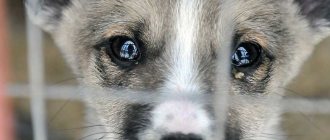From time to time, the media covers shocking stories related to cruel abuse of animals. Such cases always attract the attention of not only animal rights activists, but also ordinary citizens. People are outraged by the extreme level of cruelty towards helpless four-legged friends.
Every year thousands of appeals to law enforcement agencies, letters to television programs are recorded, active participation in movements against violence, etc. is promoted. At the same time, the punishment for intentionally causing pain to pets remains so insignificant that it does not stop flayers, who continue to break the law even after a conviction. What article can be applied for cruelty to animals and what punishment can be imposed on the perpetrator?
Administrative liability for animal abuse
At the federal level, administrative sanctions are not provided. However, any subject of the Russian Federation has the right to establish administrative liability for cruelty to animals, but it is established only in some regions:
- Moscow. For cruel treatment, transportation, or organization of illegal performances, accompanied by injuries and death of the animals participating in them, a fine of up to 2.5 thousand for individuals and for legal entities of up to 20 thousand rubles is imposed.
- Saint Petersburg. For transporting animals in unacceptable conditions, for intentionally depriving a pet of food and water, for unauthorized painful and mutilating experiments on living beings, a fine of up to 5 thousand for an individual and up to 100 thousand rubles for a legal entity is imposed.
- Nizhny Novgorod. For unauthorized docking of dogs' ears and tails, pulling out teeth and cutting off claws that does not comply with veterinary standards, a fine of up to 5 thousand for an individual, up to 40 thousand rubles for a legal entity is imposed.
- Primorsky Krai. High fines are given for catching stray and wild animals for the purpose of captivity, breeding for killing for meat and skins.
- Krasnodar region. Microchipping of pets is mandatory. Liability is provided for violation of the requirements for the treatment of domestic animals, determined by the legislation of the region on their maintenance and protection. Incurs a fine - for individuals 2 thousand rubles, for legal entities - 10 thousand rubles.
However, not all regions of the country provide for administrative sanctions. But this does not mean that inadequate people, sadists and dog hunters can act with impunity. For such individuals, there is criminal liability in all regions.
What rules should pet owners follow?
A legal artifact called “Rules for keeping dogs and cats in cities and other populated areas of the RSFSR”2 is still in force. Courts continue to refer to it when recovering damages caused by a dog to human health3. Dog owners in clauses 2 and 6 of these rules are obliged to:
- ensure the safety of others;
- prevent animals from polluting apartments, common areas in residential buildings, as well as courtyards, sidewalks, streets, etc.;
- ensure silence in residential areas;
- do not allow animals into playgrounds, shops, canteens and other similar public places;
- register and re-register dogs in a timely manner;
- do not allow animals to be kept in numbers greater than those established by the district and city executive committees. (This norm is actually “dead”. Where are these district executive committees now? However, it was “reanimated” in the new Law on the Responsible Treatment of Animals, which will be discussed below.);
- treat animals humanely: do not throw them away, do not leave food and water unattended, do not beat them, etc.;
- present animals at the request of veterinary specialists for examination, diagnostic studies, vaccinations and therapeutic and preventive treatments;
- immediately inform the veterinary institution and health authority that a dog or cat has bitten a person or other animal;
- immediately inform the veterinary institution about the sudden death of dogs or cats, about suspected rabies in animals and isolate them until specialists arrive;
- compensate for damage caused by animals.
Criminal liability for killing an animal
Criminal liability for cruelty to animals comes under Article 245 of the Criminal Code of the Russian Federation dated June 13, 1996 No. 63-FZ (as amended on December 27, 2018) “Cruelty to animals.” For criminal liability it is necessary - cruelty to animals, resulting in their death or injury, for the purposes of:
- causing suffering and pain;
- for hooligan reasons;
- for selfish reasons.
The court does not distinguish consequences for objects of the animal world according to severity. Equal criminal penalties are applied for both killing an animal and mutilating it.
The subject of this crime is animals - wild, domestic, any. The necessary sign is the occurrence of death or injury. Abuse can be expressed:
- In actions:
- beating;
- use for competitions;
- sale for fights and bleeding;
- sacrifice according to cult rites;
- conducting experiments;
- cutting off limbs;
- burning;
- hunting in inhumane ways and others.
- Inactive:
- deprivation of food and drink;
- intentionally leaving others in a life-threatening situation.
Organizers of dog, cock and any other fights also face criminal penalties under Article 245 of the Criminal Code of the Russian Federation. In practice, this is quite difficult to prove.
Criminal liability is brought only if the person who committed the crime has reached 16 years of age and is sane - understands what he is doing and what consequences are possible.
Teenagers under 16 years of age are also punished, but in a different way - they are registered with the commission for minors. The commission decides what to do with the juvenile offender:
- apply educational measures, conduct an explanatory conversation;
- transfer the case to the court to send the teenager to a closed educational institution.
Part 1 art. 245 of the Criminal Code of the Russian Federation
Punishment under Part 1 of Article 245 is possible as follows:
- A fine of up to 80 thousand rubles (or a deduction of 6 months’ income).
- Up to 15 days of compulsory work.
- Correctional labor or restriction of freedom for up to 12 months.
- Arrest for up to six months.
- Imprisonment up to 3 years.
Punishment for a crime under Art. 245 Criminal Code of the Russian Federation
Types of punishments:
- Penalties. The amount is determined based on the severity of the harm that was caused to the pet (the maximum amount is 80 thousand rubles).
- Completing mandatory work. The period is also determined depending on the form of expression of cruelty and the final result (maximum volume 360 hours).
- Restriction of freedom within 1 year.
- Deprivation of liberty. To take the culprit into custody, the prosecution must collect sufficient facts to prove that the offender used particularly cruel methods of bullying.
In court hearings, the prosecution authorities often use the term “flayering”. In Art. 245 nothing is said about it, but its meaning is precisely connected with the manifestation of cruelty towards animals. Flayering refers to the actions of criminals committed with particular cruelty. For example, skinning for one's own benefit is perceived as knackering.
How to sue an animal killer?
Witnesses to a murder or owners of an animal killed by a third party should do one of the following:
- The owner of a pet or an eyewitness who observed a cruel reprisal against a stranger or a stray animal needs to report it to law enforcement agencies. Cases involving cruelty to any animal object are dealt with by officers from the police department at the scene of the crime. A criminal case is heard in the court in whose jurisdiction the crime occurred.
- The owner must file a claim in court for compensation for material damage (pets and livestock are included in the category of property). If property is damaged, the offender must compensate the cost of the killed animal.
What to do if you are bitten by someone else's dog?
- Contact a medical facility to prevent the risk of rabies and record damage.
- Then contact the police - submit a statement, register it using a KUSP coupon with the number and date of application, tell about the circumstances of the bite and provide copies of medical documents.
- Pass a medical examination as part of a medical examination appointed by the detective, district police officer or investigator as part of the pre-investigation check.
- Find and provide the authorized police officer with information about witnesses who can confirm what happened.
- Apply to an authorized police officer to seize video recordings if there are video cameras near the scene of the incident.
If serious harm is caused, a criminal case will be initiated.
In this case, the victim must follow all the doctor’s recommendations and the investigator’s instructions regarding the documentation of treatment measures, medications, vaccinations, etc., in order to avoid disputes about the severity of the harm. Remember: if the harm turns out to be mild or moderate, the criminal case will be dismissed. After the case is transferred from the preliminary investigation authorities to the court, a criminal trial will be held and a verdict will be rendered.
A claim for compensation for damage due to a bite can be brought after the initiation of a criminal case and before the end of the judicial investigation when considering the case in the court of first instance. When filing a claim, the civil plaintiff is exempt from paying state duty (Part 2 of Article 44 of the Code of Criminal Procedure of the Russian Federation).
If minor harm is caused, then you should apply to the district court at the place of residence of the dog owner with a claim for compensation for damage. It will be necessary to provide evidence that the victim incurred expenses for medicines, doctors’ services and experienced moral suffering in order to recover compensation for moral damage. In addition, a resolution should be attached to refuse to initiate a criminal case, where the fact of the bite and the dog’s belonging to a specific owner are established, or a resolution to bring the owner to administrative liability.
In what cases is there no punishment for killing an animal?
The crime must be committed only with direct intent, that is, the criminal is aware of the consequences and desires them. The following will not be held criminally liable:
- a minor under 16 years of age;
- an insane, mentally ill person;
- defending himself from a wild animal, an aggressive alien pet or a pack of stray dogs;
- a motorist who hits a wild or stray animal crossing the road.
In the case of self-defense , which leads to the death of the attacking animal, it is not the person who defended himself who is punished, but the owner who did not take care of proper education, equipment when walking, or training the pet. For example, if the defender causes more than average harm to health, the owner of the animal will have to answer under Article 118 of the Criminal Code of the Russian Federation of June 13, 1996 No. 63-FZ (as amended on December 27, 2018) “Causing grievous harm to health through negligence.” When defending against aggressive stray dogs, the defender is also not punished.
Hitting an animal relates strictly to a road accident; in this case, administrative liability is not applied. The driver is punished only for violating traffic rules, if any. If the animal is not stray, the owner will have to pay financial damages for killing. If a wild animal is shot down, the damage is assessed depending on its value and rarity in accordance with the order of the Ministry of Natural Resources of Russia dated December 8, 2011 No. 948 (as amended on November 17, 2017) “On calculating the amount of damage caused to hunting resources.”
What responsibilities does the new law impose on dog owners?
Late last year, the Responsible Animal Welfare Act4 was adopted, most of which have already entered into force. Article 9 of this law establishes general requirements for keeping animals that each owner must fulfill:
- proper care;
- timely provision of veterinary care and implementation of mandatory preventive measures;
- preventing the appearance of unwanted offspring;
- provision of an animal at the request of officials of state supervisory authorities in the field of treatment of animals during inspections;
- management of biological waste in accordance with the legislation of the Russian Federation (the owner’s obligation to ensure that his dog does not pollute public places and urban areas was established in Soviet legislation, and responsibility is provided for by modern laws, for example the Code of Administrative Offenses of Moscow);
- If a person can no longer keep an animal, he is obliged to transfer it to a new owner or to a shelter.
For violation of these rules, dog owners are subject to liability, which will be discussed in detail below.
In addition to meeting the general requirements for keeping animals, the dog owner must:
- respect the rights of persons living in the same apartment building as him;
- while walking the dog, ensure the safety of citizens and animals, the safety of other people's property; exclude the possibility of uncontrolled movement of the animal when crossing the roadway, in elevators and common areas of apartment buildings, in courtyards, on children's and sports grounds; ensure the cleaning of animal waste products in public areas; do not walk the animal outside the places where it is permitted by the local government.
Who are dog hunters and do they face criminal punishment?
There are probably no people left who have not at least heard about the dog hunter movement, which, despite protests from society and animal advocates, is gaining popularity in our country. The main goal of dog killers is to kill stray animals. Of course they justify killing an animal:
Dog hunters can include almost all groups of the population:
According to statistics from experts in criminology and psychiatry, often dog hunters are people with mental disabilities, for whom killing an animal is not an out of the ordinary action.
In other words, the activities of dog hunters are contrary to the law and may result in criminal, administrative and civil liability.
From the history of criminology: about a third of serial killers began by killing domestic animals or stray dogs.
Cruelty to animals concept, article, punishment
- Cruelty that involves excessive control of an animal. For example, beating a dog for the slightest offense.
- Revenge on the animal. For example, executing a dog for trespassing on a neighbor's property.
- Expressing aggression through an animal. For example, being kept in the dark and deprived of food to create anger.
- Increased prestige. For example, a subject kills animals with a gun in order to hone his shooting skills.
- Committing illegal acts for fun. For example, torturing or harming an animal in a crowded place (in public).
- Sadism. Mental deviation, expressed in causing harm in order to obtain personal satisfaction. Quite often it manifests itself among weak and vulnerable people who are not inclined to achieve power in any other way.
Arbitrage practice
Example 1. Marina was walking in the park with a friend, the girls met two young men, they invited them to their place. Marina’s acquaintance very soon began to insist on sexual contact, blocked everyone from leaving the apartment, mocked the woman, and insulted her.
Desperate, Marina ran to the kitchen, grabbed a knife there and stabbed the offender in the chest. As a result, the man died.
In court, Marina insisted that she was defending herself. However, the woman's testimony was not confirmed.
The judge determined that the woman's life was not in danger at the time of the stabbing. The man did not threaten anything, did not beat Marina, he just stood at the door. Qualification under Article 108 did not take place.
Marina was sentenced to 5 years in prison under Article 111 (intention + grievous bodily harm + death).
Example 2. Sergei and two friends, Konstantin and Andrey, had the usual alcoholic gatherings in their lives. At some point, Sergei and Andrei began to quarrel, and Andrei hit Sergei in the face several times.
Konstantin did not separate his friends, but joined in beating Sergei. Andrei grabbed the knife and tried to hit Sergei, but he took the weapon away and used it himself. As a result of damage to the femoral artery, Andrei soon died.
Sergei was sentenced under Article 108 (imprisonment, term - 1 year 4 months). However, Sergei filed an appeal. At the next court hearing, the verdict was overturned for several reasons.
It was taken into account that Sergei alone defended himself from two attackers. The threat to Sergei’s life was recognized as real, since Andrei delivered the first blows, and it was he who grabbed the knife.
Legal practitioners note that Russian courts have developed a harsh punitive policy in such cases. It can be very difficult to prove that a random killer actually defended himself within acceptable limits. As a result, the victims of the attack find themselves accused and sentenced very harshly.
And finally, we will talk about killing a dog in self-defense.
To learn how to properly defend yourself with a knife, and what awaits a person who kills another using such a weapon in self-defense, watch the following video:
Where to apply, sample application
If you witness an animal suffering, you need to know where to turn in this case. A person can complain to the nearest police station by writing a statement.
Important! You can contact and report a crime not only during the working day, but also at night. In this case, it is enough to contact the operational duty officer
The complaint can be written at home or at the police station. In both cases, it is worth using a sample that will help prevent errors in the document. At home, you can use the Internet and look at a sample on the official website of the department. When contacting the police, it is worth remembering that an example of a statement is located on the information board. It should also be noted that it is possible to report what happened orally. The employee will draw up a protocol, which must be read and, provided that everything is correct, signed.
If you decide to report in person rather than leave a complaint on the Ministry of Internal Affairs website, then you need to take a coupon from the receiving employee, which indicates the registration number of the document and the date of acceptance. You will be notified of the decision 10 days after submitting the paper.
The investigative jurisdiction of the norm in question falls under the jurisdiction of internal affairs bodies.
What is animal cruelty
In legislative acts, cruel treatment is such treatment of an animal, the purpose of which is to cause pain or suffering to it. The purpose may also be hooliganism or self-interest. The result is death or injury to the animal.
The law does not provide restrictions regarding whether an animal is domestic or wild, meaning that it can either belong to a specific person or not belong to anyone. It is worth noting that the legislator protects only those individuals that belong to higher vertebrates, such as birds or mammals. For example, fish, amphibians and other species do not fall under this concept.
The use of a dog or other creature for various types of combat may be considered abuse. Leaving an individual in conditions that do not allow obtaining water or food will also be considered.
The described crimes entail liability not only on the territory of Russia, but also in other countries, such as England, Germany, Latvia, Belarus, Kazakhstan, Ukraine, the USA and others.
Part 2 art. 245 of the Criminal Code of the Russian Federation
The same act committed:
a) by a group of persons, a group of persons by prior conspiracy or an organized group;
b) in the presence of a minor;
c) using sadistic methods;
d) with public demonstration, including in the media or information and telecommunication networks (including the Internet);
e) in relation to several animals - is punishable by a fine in the amount of one hundred thousand to three hundred thousand rubles, or in the amount of the wages or other income of the convicted person for a period of one to two years, or by corrective labor for a term of up to two years, or by forced labor for a period of up to two years. for a term of up to five years, or imprisonment for a term of three to five years.
Article 244 of the Criminal Code of the Russian Federation Desecration of the bodies of the dead and places of their burial Article 246 of the Criminal Code of the Russian Federation Violation of environmental protection rules during the production of work
Features of the crime
Exceeding the limits of permissible self-defense resulting in death is covered by Article 108 of the Criminal Code of the Russian Federation. The second paragraph refers to accidental murder during arrest, the first covers all other cases.
For the uninitiated, the article is usually difficult to understand without official commentary. It reveals some subtleties.
For example, for a better understanding of Article 108 in relation to murder in or for the purpose of self-defense, it is also necessary to familiarize yourself with Articles 37 and 38 of the Criminal Code of the Russian Federation. They reveal some aspects of the processes of self-defense and detention.
Equally important is Resolution No. 19 of the RF Supreme Court, which was approved on September 27, 2012. It also explains many issues and circumstances. Here are the main ones:
- The deprivation of a person’s life is permissible if it is impossible to do without it during defense or detention. This provision is enshrined in a special international Convention.
- The professional and/or special training of the victim of the attack is not important.
- It also doesn’t matter whether a person is defending himself or defending others.
- Violence or the threat of violence in which the victim becomes defensive must be real. For example, the attacker is holding a weapon, threatening it, or already using it (trying to hit).
- The investigation must recognize that the chosen method of self-defense was appropriate to the situation. An example of inconsistency: the criminal grabbed the victim by the shoulder, and in response received a bullet and soon died.
- It is important to consider that the victim of an attack cannot always correctly assess the degree of danger. When defending, a person often experiences confusion and fear. In such a state, it is difficult to evaluate each of your actions with full responsibility.
- Damage to property is not considered violence. If an attacker breaks the lock of a car, and the owner of the car kills him at the same time, the excess is obvious.
- In a situation where the attacker has already retreated and/or stopped making threats, there is no need to defend yourself. If the victim does not stop and commits murder, her actions are classified without connection with the necessary self-defense. Perhaps we will talk about a state of passion.
- If a person first provokes an attack and then defends himself, such actions will not be considered self-defense.
The resolution also contains other clarifications that may be more or less significant depending on the specific situation.
The following video will tell you in more detail about the features of such a crime as murder in self-defense:








